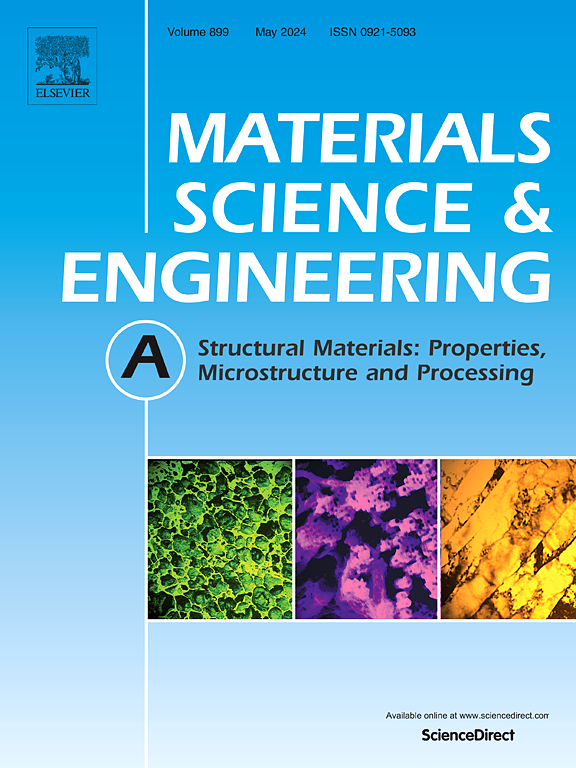双非均相层状Cu/Cu- ag - hea复合材料的微观结构特征与性能
IF 7
2区 材料科学
Q1 MATERIALS SCIENCE, MULTIDISCIPLINARY
引用次数: 0
摘要
由于铜基复合材料的内在权衡,实现强度和导电性的同时增强仍然是一个长期的挑战。在本研究中,采用累积滚焊(ARB)法制备了双非均相层状Cu/Cu - 6% Ag-HEA复合材料,分别加入1 wt %和3 w %的高熵合金(HEA)粉末。Cu/Cu - 6% Ag-3 %HEA复合材料具有最佳的性能平衡,抗拉强度为558 MPa,均匀伸长率为16%,电导率为81% IACS。详细的微观结构表征表明,这种优越的性能是由交替的非均相层、均匀分散的HEA和Ag纳米粒子、连续的电子传递网络和减少的电子散射界面的协同作用产生的。这种层状结构有效地缓解了铜合金中传统的强度-导电性难题。本研究不仅证明了强度-延性和强度-导电性组合的同时改善,而且为先进的cu基层状复合材料建立了新的设计策略。本文章由计算机程序翻译,如有差异,请以英文原文为准。
Microstructural characteristics and properties of dual-heterogeneous layered Cu/Cu-Ag-HEA composites
Achieving concurrent enhancement of strength and electrical conductivity in copper-based composites remains a longstanding challenge due to their intrinsic trade-off. In this study, dual-heterogeneous layered Cu/Cu–6 %Ag–HEA composites were fabricated by accumulative roll bonding (ARB), incorporating 1 wt % and 3 w % high-entropy alloy (HEA) powders. The Cu/Cu–6 %Ag–3 %HEA composite exhibited an optimal property balance, achieving a tensile strength of 558 MPa, uniform elongation of 16 %, and electrical conductivity of 81 % IACS. Detailed microstructural characterization revealed that the superior performance arises from the synergistic effects of alternating heterogeneous layers, uniformly dispersed HEA and Ag nanoparticles, continuous electron transport networks, and reduced electron-scattering interfaces. This layered architecture effectively alleviates the conventional strength–conductivity dilemma in copper alloys. The present work not only demonstrates a simultaneous improvement in strength–ductility and strength–conductivity combinations but also establishes a new design strategy for advanced Cu-based layered composites.
求助全文
通过发布文献求助,成功后即可免费获取论文全文。
去求助
来源期刊

Materials Science and Engineering: A
工程技术-材料科学:综合
CiteScore
11.50
自引率
15.60%
发文量
1811
审稿时长
31 days
期刊介绍:
Materials Science and Engineering A provides an international medium for the publication of theoretical and experimental studies related to the load-bearing capacity of materials as influenced by their basic properties, processing history, microstructure and operating environment. Appropriate submissions to Materials Science and Engineering A should include scientific and/or engineering factors which affect the microstructure - strength relationships of materials and report the changes to mechanical behavior.
 求助内容:
求助内容: 应助结果提醒方式:
应助结果提醒方式:


